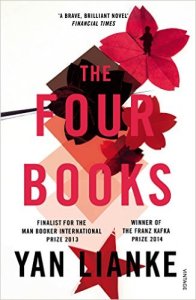 Translated from the Chinese by Carlos Rojas, ‘The Four Books’ by Yan Lianke is set in a labour camp in the ninety-ninth district near the Yellow River in north China where the Theologian, the Scholar, the Musician, the Author and other disgraced intellectuals are tasked with growing crops and smelting steel as part of their political “re-education”. The camp is led by a juvenile commander known as the Child who is also seeking approval from the “higher ups” in the party. However, as the economy fails and famine sets in, the inmates are left to survive on their own in appalling conditions.
Translated from the Chinese by Carlos Rojas, ‘The Four Books’ by Yan Lianke is set in a labour camp in the ninety-ninth district near the Yellow River in north China where the Theologian, the Scholar, the Musician, the Author and other disgraced intellectuals are tasked with growing crops and smelting steel as part of their political “re-education”. The camp is led by a juvenile commander known as the Child who is also seeking approval from the “higher ups” in the party. However, as the economy fails and famine sets in, the inmates are left to survive on their own in appalling conditions.
I would have been a bit lost without the translator’s note at the beginning of the book which provides some helpful context to the story. Although the impact of the Cultural Revolution has been widely reported, an earlier period in modern Chinese history known as the Great Leap Forward (1958-1961) is considerably less well-known despite its devastating consequences. Most notably, there was a widespread famine in which up to 45 million people starved to death after Mao’s economic policies failed spectacularly and it is the controversial events during this period which are explored in ‘The Four Books’.
The prose consists of interwoven extracts from four narratives and Rojas captures the different voices of these very well in his translation. The two main texts are ‘Criminal Records’ which is the Author’s collection of secret reports of wrongdoings by his fellow inmates compiled for the Child and ‘Old Course’ which is the Author’s 500-page personal memoir. There are also extracts from an anonymous manuscript known as ‘Heaven’s Child’ and finally, ‘The New Myth of Sisyphus’ which is a philosophical text only briefly featured in the final chapter. The title also echoes the four Gospels of the New Testament as well as the Confucian texts known as the Four Books.
I initially thought ‘The Four Books’ was going to be very hard-going but once I got into the rhythm of the different narratives, I found it to be a lot more readable. The Child is a very sinister character who delights in dishing out punishments and enforcing draconian rules. The satire is particularly effective in highlighting the absurdity of ever-increasing targets as well as the rewards system at the camp in which inmates earn red blossoms and stars for effort and obedience with the promise that they will be released if they collect enough of them. Unsurprisingly, literary censorship is another key theme as the inmates attempt to hide their copies of banned books before the Child can confiscate them. This is all the more affecting with the knowledge that ‘The Four Books’ itself has never been published in mainland China.
Yan Lianke has previously been longlisted for the Man Booker International Prize in 2013 in its previous incarnation as a biannual award recognising an author’s entire body of work. As one of the more challenging books I’ve come across on this year’s Man Booker International Prize longlist so far, ‘The Four Books’ is well worth persevering with and ought to be another serious contender for the shortlist.





Ouch 😦 Sounds so sad, I don’t think I could read this.
LikeLike
It’s not a book I would read for enjoyment as such but it’s very powerful.
LikeLike
A tough read I like way he showed many sides in the narratives I liked it more than dreams of ding village
LikeLike
Yes this seems to have had stronger reviews than his other books. Looks like it could make the shadow panel shortlist based on feedback so far if not the real one.
LikeLike
You have given me a very rich background about this book. I think I will consider reading it.
LikeLike
Hope you enjoy it!
LikeLike
Pingback: The Four Books by Yan Lianke (Man Booker International Prize long list) | Dolce Bellezza
I’m about two thirds of the way through this. Like you say, it’s much more readable than you might expect – and the Child is a very sinister character!
LikeLike
Definitely!
LikeLike
This sounds good – I’m going to have to read this one!
LikeLiked by 1 person
Pingback: 2016 Best Translated Book Award Longlist – combined reviews | ANZ LitLovers LitBlog
I thought it was brilliant, I never really understood how the Cultural Revolution worked until I saw how the Higher-Ups manipulated everything in this book.
PS I have added this review to the others on my Man Booker International Longlist Combined Reviews page.
LikeLike
Thanks!
LikeLike
Pingback: 2016 Man Booker International Longlist | ANZ LitLovers LitBlog
Pingback: A Strangeness in My Mind by Orhan Pamuk | A Little Blog of Books
Pingback: Do Not Say We Have Nothing by Madeleine Thien | A Little Blog of Books
Pingback: My Books of the Year 2016 | A Little Blog of Books
Pingback: New Books Coming Soon in 2017 | A Little Blog of Books
Pingback: The Man Booker International Prize 2017 Longlist | A Little Blog of Books
Pingback: The Man Booker International Prize Longlist 2017 | A Little Blog of Books
Pingback: Man Booker International Prize Reviews: Part 1 | A Little Blog of Books